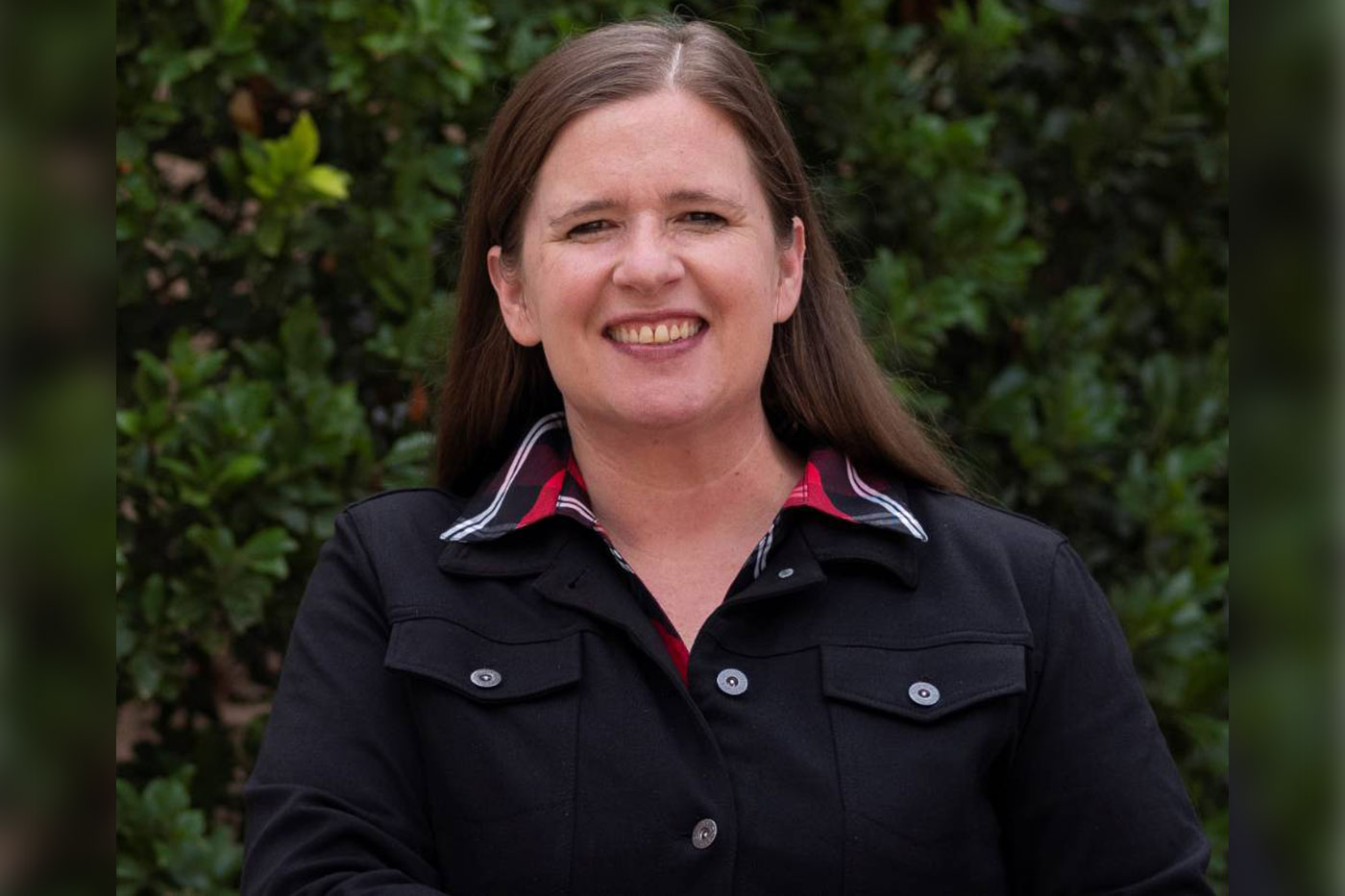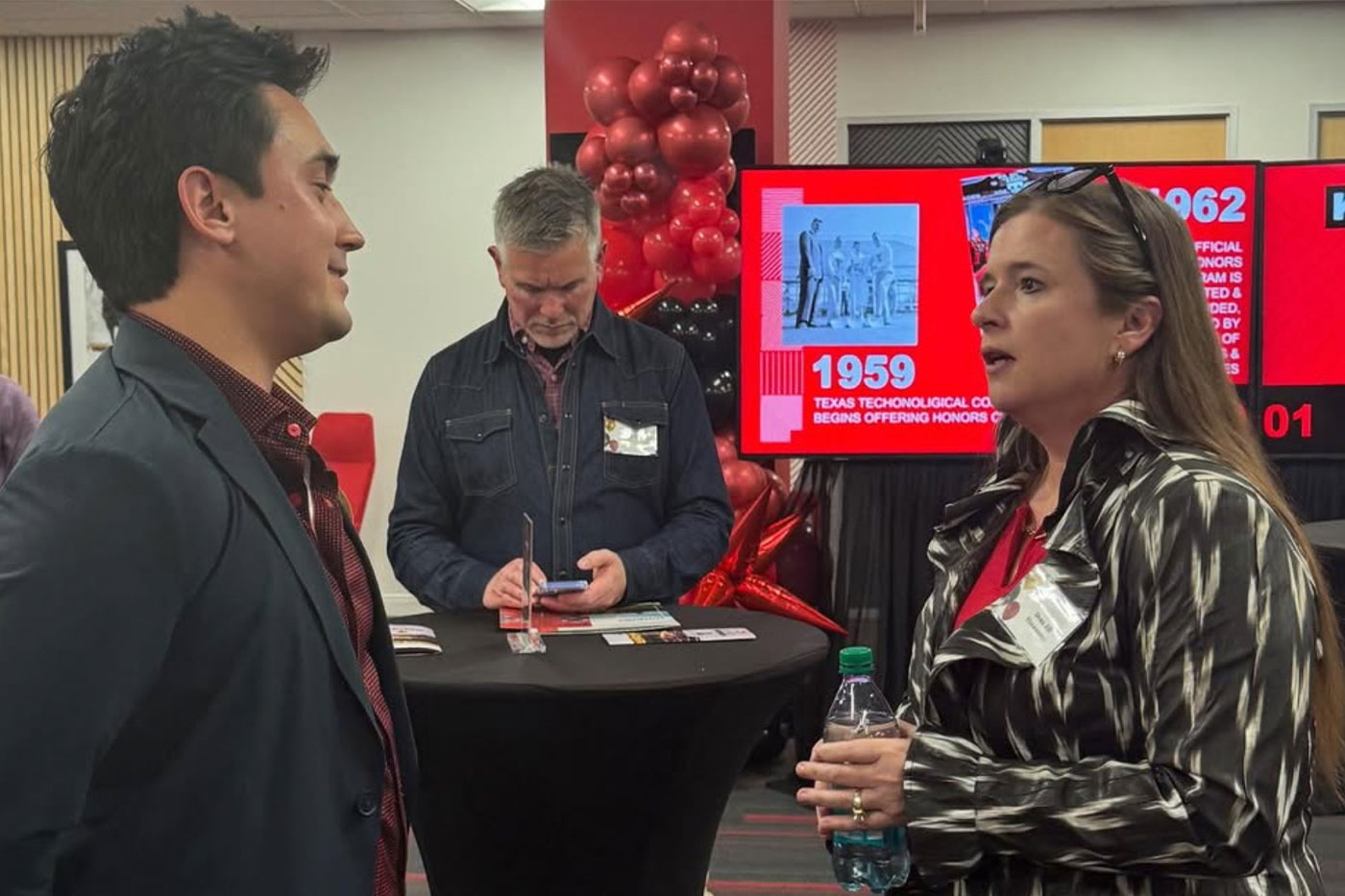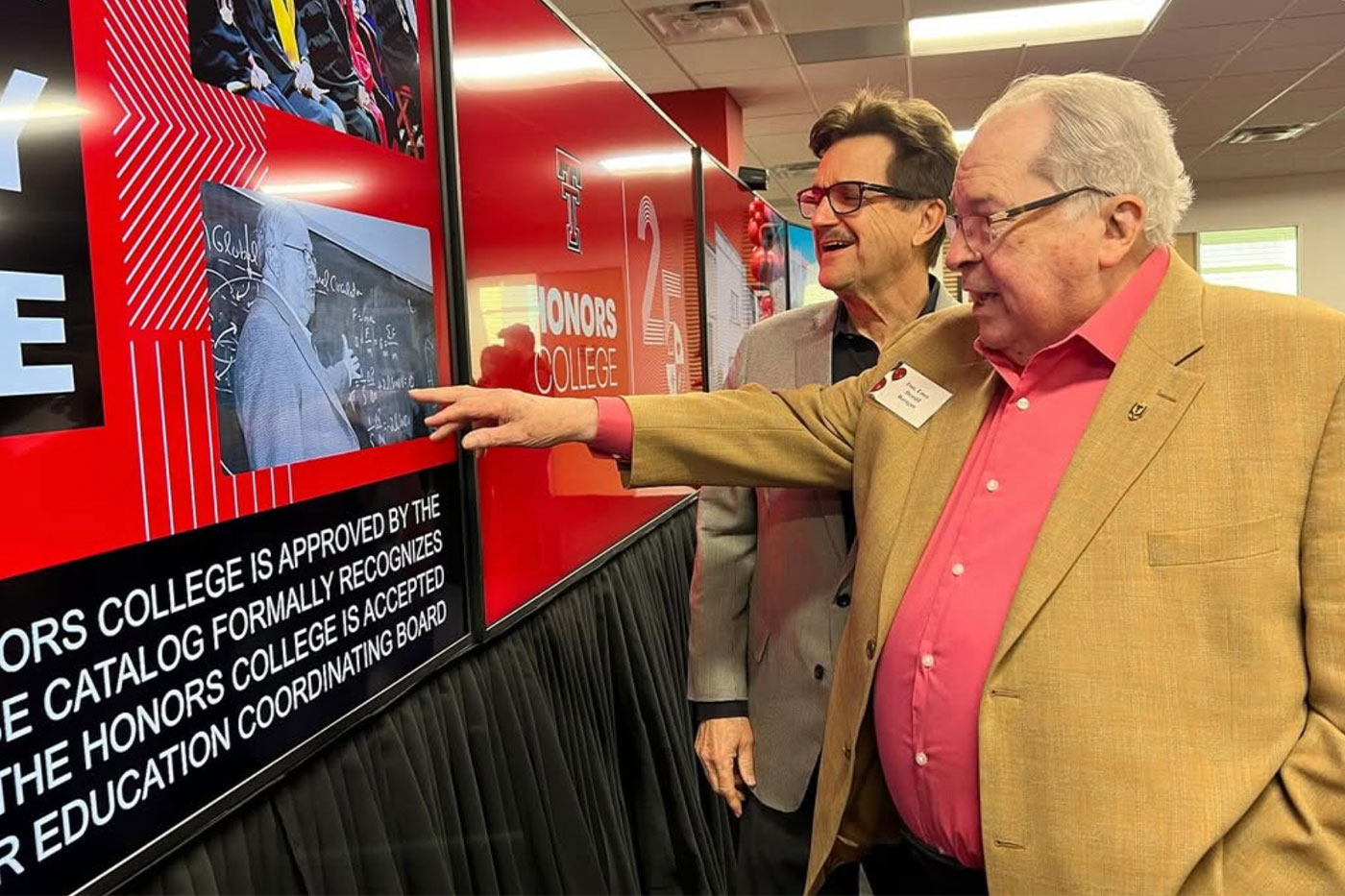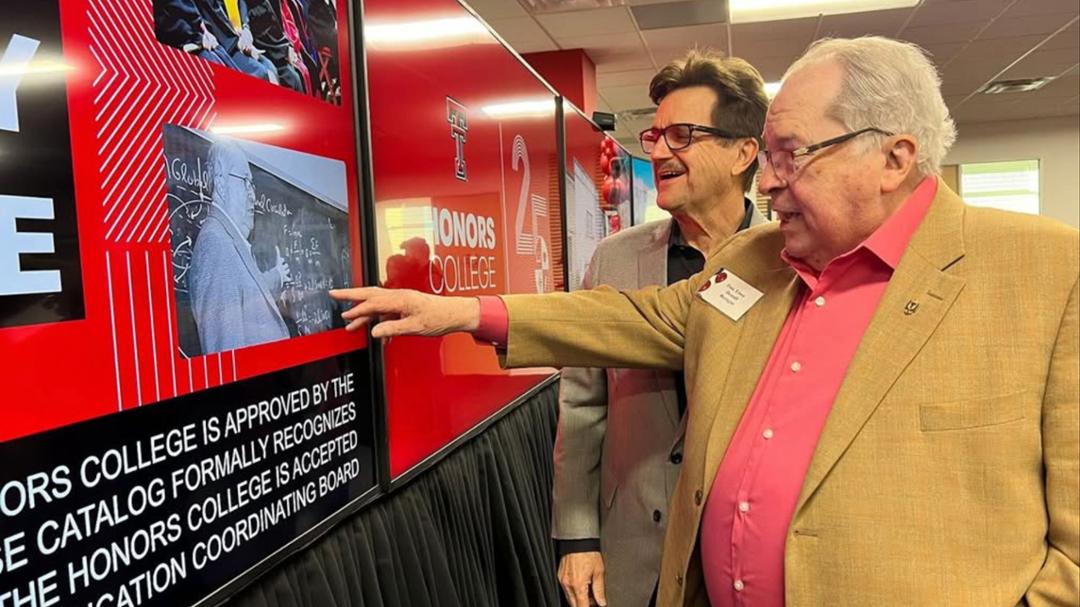Texas Tech leaders recently unveiled numerous major initiatives aimed at further lifting the Honors College’s status and level of service in the state of Texas.
The past, present and future of Texas Tech University’s Honors College collided in late February at Texas Tech DFW, where alumni and current leaders gathered to celebrate the Honors College’s 25th anniversary.
President Lawrence Schovanec, Provost Ron Hendrick, Dean Jill Hernandez and President Emeritus Donald Haragan were among many who spoke glowingly of what the Honors College has become and what is on the horizon. The event was the first of two scheduled for this year to recognize this milestone, but it doesn’t mean the work is done.
The push for more is exactly what Hernandez loves about her job, befitting of someone who hit the ground running in 2022 and hasn’t looked back since.

“The idea when I came in wasn’t to do something different,” she said. “The goal was to assess where the Honors College was not. I had to ask, ‘Where is the Honors College?
Are our students in that place?’ And then see how we could have the Honors College be where our students are and maximize their experiences at Texas Tech.”
Hernandez recalled hearing the Honors College referred to as the jewel of the university on her initial visits, from President Schovanec on down to Honors students. Thus, she began her role as dean determined to steward the institution and continue it down an already inspiring path as something that has persevered and been cultivated to serve Texas Tech since its establishment as a separate entity in 1999.
In her first year, Hernandez expanded the Honors College’s reach across campus by launching VIP Admissions, which invites into the fold Texas Tech students achieving academically at the same level of Honors students but outside the program. The initiative has already yielded striking results, with VIP students spending more time on community engagement activities and remaining in Honors at a 30% higher clip than those who enter out of high school.
But just as quickly as it arrived, VIP Admissions will be modified as Honors College administrators look to tweak the institution into the best Texas has to offer.
“Jewel was the right word,” Hernandez said. “It’s persevered. It’s beautiful. It’s been cultivated. And at the anniversary party, we ended up talking about that, that this jewel continues to develop and strengthen as we mature. Our goal is to make sure we are the preeminent destination for Honors pedagogy, research and mentorship in the state, and that’s where we’re moving.”

The alteration of VIP Admissions was one of four announcements made at the celebration in Irving, high among the Honors College’s priorities but just behind No. 1: become an endowed college by 2035.
Doing so would place Honors in the company of other honors colleges from universities across the country, generating not only brand recognition but a central idea easily communicated to people outside Honors’ immediate sphere of influence.
Becoming endowed would also lead to funding for students’ research experiences and ensure further faculty engagement, Hernandez said.
The second announcement is where VIP Admissions comes in, as it will be rebranded as the San Francisco Scholars Program to honor former Dean Michael San Francisco.
Non-honors students who enter the college by way of VIP already have a heart for connection, as San Francisco displayed through his leadership of the Bayless Elementary Mentoring Program. Their participation in Honors isn’t just to boost their high academic achievement, but for an opportunity to lead and grow in community among like-minded students.
While the San Francisco Scholars Program will further the Honors College’s mission of serving Texas Tech, the next initiative of establishing a new early commitment pathway to the university and the Honors College fulfills the needs of young students across Texas.
The creation of the Senarian Leaders program is in direct response to a recent decision by the University of Texas at Austin, in which the school will restrict providing automatic admission to the top 5% of Texas high school seniors for fall 2026 instead of the top 6%.
“Senarian” refers to the senary numeral system that operates around the base of six.
Hernandez kept thinking of those six-percenters who had the rug pulled out from underneath them and wanted the Honors College to be one for the state by taking the top 10% of students and asking for an early commitment in return.
“We really are playing offense for the first time, and we’re working with stakeholders all across the university, including financial aid, strategic enrollment, our own scholarship team and marketing,” she said.
Students attending the Honors College through Senarian Leaders will have a personalized pathway through Texas Tech, including their own First-Year Experience Program, mentorship with deans and directors throughout their second semester, and leadership opportunities in subsequent years.
Hernandez is elated at this first instance of the Honors College directly recruiting top students and at the kind of students the college will attract through this pathway. The students will feel like they truly belong, with programs and experiences not offered anywhere else in Texas.
The word “commitment” is of particular importance to Hernandez.
Texas Tech is asking seniors to take a chance on the university, and for its part, Texas Tech and the Honors College are striving to intentionally develop and shape students through externships, paid research opportunities, advising through the Retention & Resilience program, close connections to state leaders and scholars, and a wealth of other experiences.
“I am really proud of our team, to be at a point where we can deliver this as a part of our stewardship and living in service of Texas Tech,” Hernandez said.
This program also seeks to keep top scholars in Texas, regardless of what other schools do.
Jumping from aiding the state to benefitting the world, the fourth and final announcement from the anniversary celebration involves the launch of Texas’ first research away program.
Students will spend a week in May learning various research methods before selecting an existing global issue they will address by traveling abroad for seven to 10 days and observing and working with local organizers and practitioners. Upon their return to Texas Tech, students will be invited to conduct paid research through the Undergraduate Research Scholars Program.
First-generation students will particularly benefit as they can avoid the burden begat by longer experiences normally associated with Study Abroad. The affordable research away program will involve less financial risk, instead challenging first- and second-year students to take a small step out of their comfort zone by getting on an airplane, going to another country and getting involved in an immersive manner.
Hernandez highlighted that students will be provided a model of attacking problems through interactions with community leaders, an example of Honors administrators’ priority of vision, or illuminating for others what can’t yet be seen.
“What I love about research away is that students will get a vision of what their enormous gifts can do when applied to challenges in the world, and that they can see as undergrads, as 18-, 19- and 20-year-olds, they can actually work to effectuate change on what seemingly are intractable problems,” she said.
The jubilation at the anniversary event was not only shared by alumni and top Texas Tech administrators but members of the Honors College Advisory Council, who all are Honors College alumni.
Their integral role in the creation of new strategies added meaning to their contributions in Irving.
“To hear them talk so passionately about how the Honors College transformed their life, and how they continue to invest in Honors as a way of connecting to students and giving them experiences they otherwise wouldn’t have, was really moving,” Hernandez said.
“But there was also this electricity in the room, because there’s a coalesced enthusiasm about where we’re going, and taking all of what we’ve done in the past as a gift and down payment for what we’re going to be.”
These new initiatives aren’t just lofty goals for the Honors College to aim for by 2050, but active programs Hernandez, her faculty and staff are working on, bolstered by the confidence and support of Texas Tech administrators.

“The Honors College has always been a shining example of academic excellence, and as we celebrate its 25th anniversary, we recognize its remarkable journey and the exciting future that lies ahead,” said President Schovanec. “Through the leadership of Dean Hernandez and the efforts of our students, faculty and alumni, the Honors College not only provides exceptional opportunities for students but also elevates the reputation of Texas Tech.”
Added Provost Hendrick, “The college’s impact can be seen in the way it fosters interdisciplinary collaboration, supports research and creative inquiry and provides an environment where students are challenged to go beyond expectations. Through small class sizes, dedicated faculty and a commitment to experiential learning, the Honors College continues to be a driving force behind Texas Tech’s pursuit of excellence.”
Hernandez said there is talent and time being dedicated at Texas Tech to address significant need in Texas. When those factors are involved, transformation occurs.
She is energized daily by what is required to make Texas Tech the destination location in the state and to continue the university’s unique tradition, especially as an R1 institution, of commitment to student success.
“I’ve never been at an institution that is more focused on student success than Texas Tech, and I’ve been at other research institutions,” Hernandez said. “This is such a special place for that.
“I get to wake up every morning, and my day is about students. Every single morning, and this is not hyperbolic, has been a joy.”
The second celebration of the Honors College’s 25th anniversary will occur in Houston on Friday, Oct. 3, the day before Texas Tech football plays at the University of Houston.

